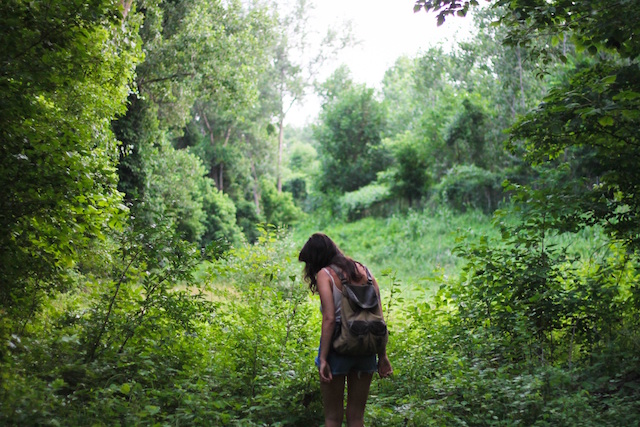
*Support Aaron Perry’s kickstarter. Aaron is an old buddy of Waylon’s and he’s doing super cool work to make the planet a better place. Please check out his project.
Go take a hike.
Ever heard this phrase before? Not always the nicest thing to hear, right? But what if “taking a hike”—simply walking—is just what we need to get smarter and feel better?
Seriously.
As it turns out, for our own health and mental performance, one of the best life hacks that we can incorporate into our busy lives is frequent walking.
That’s right, walking.
Where did I get that one, you might ask?
Well, as mentioned in my previous article, “Soil Spirituality,” I have learned a lot from my Grandpa Bear—especially the importance of three key activities: gardening, reading, and…you guessed it: walking.
It is remarkable how my grandfather—through the decades in which our society saw drastically increasing automobile dependence and hyper-accelerating pace of life—maintained a slower, steadier pace. A slower, steadier pace that, I am convinced, has caused him to live an extraordinarily long, healthy life. He will be celebrating his 99th birthday next month!
Whether alone, with a friend, a (lucky and happy) grandchild, or a trusted canine companion, hardly a day went by—all year long—that my grandpa wouldn’t take a good, long walk.
I am convinced that his regular, extensive walking is a primary reason my Grandpa Bear has lived so long and maintained such mental clarity. And I am not alone in this perspective.
As Gary Snyder wisely tells us: “Walking is the great adventure, the first meditation, a practice of heartiness and soul primary to humankind. Walking is the exact balance between spirit and humility.”
Increasingly, neuroscientists, psychologists and kinesiologists are connecting the dots between rates of regular walking and cognitive performance, physical health and emotional well-being. Say again? You got it: walking a lot makes us smarter and helps us feel better.
Hard to believe?
Let’s take a quick “stroll” through some of the latest science:
As indicated by Dr. Susan Whitbourne in her Psychology Today, article “Get Out and Walk! Your Brain Will Thank You,” walking enhances not only brain health in general, but memory in particular. Whitbourne and other scientists are discovering the wondrous plasticity of our brains, and how simple, routine aerobic activities can enhance our brains’ performance and function well into old age. Whitbourne cites research published in the prestigious Proceedings of the National Academy of Sciences, Dr. Kirk Erickson of the University of Pittsburgh, where the data shows that walking prevents and delays cognitive decline. Particularly noted were growth in the hippocampus—a region of the brain that often shows shrinking in people suffering from Alzheimer’s disease—along with improved memory. Regular walking, Whitbourne writes of subjects in the study, “increases their memory scores.”
Of course, as an alternative to the extended periods of sitting that are now so pervasive in our culture, walking provides substantial benefits. Citing research recently published in the journal Circulation, Suzy Strutner writes in her Huffington Post article, “Sitting All Day Is Even More Dangerous Than We Thought,” that numerous and frequent interruptions to sitting, by getting up and walking around, measurably reduce the negative health impacts resulting from too much sitting.
So, as you see, the science is starting to catch up to my Grandpa Bear’s ageless wisdom.
But all of this has gotten me thinking even more about our life choices, and the degrees to which we choose between sitting, standing and walking. (Even as I write this very sentence, I have just transitioned from sitting to standing at my elevated laptop—and feel much better when I do!)
Let’s get a bit outside the box here and muse a bit.
Is it possible that our very DNA is “wired” to resonate and respond to the rhythms of walking? That the one-two-one-two pattern of movement, with its slight sway and secondary rhythms of hip swings, arm swings and, in many cultures, corresponding songs might nourish our bodies and minds? Is it possible that when we frequently walk, our neurotransmitters are firing more and making far greater trans-hemispheric neural pathway connections than when we’re sitting sedentary? I surmise our science will soon have widely and conclusively convinced us that walking is essential to being a healthy human being.
That frequent, regular walking is essential to being a healthy human being.
Is it possible, as Tom Vanderbilt suggests, in his Slate.com article, “The Crisis in American Walking,” that the very act of walking is related to not only our sense of well-being but also our intelligence?
Early childhood experts have developed an increasingly sophisticated understanding of how our very brain development is closely intertwined with our neuro-physical developmental pathway to walking. This pathway is one which some of us in the business world evoke when we describe the evolution of our start-up enterprises: “crawl, walk, run.” Indeed, each phase is critical to brain development (and we might learn, organizational development), and according to the experts should not be rushed by the parents.
As babies, we begin to move our bodies and enter into the vast world made possible by locomotion. Along the way, our brains develop complex neural-networks that take in and process huge sets of sensory data streaming from the surrounding world. Nearby walls, toys, furniture, trees, bushes and other obstacles become the analogue structures with which the brain develops sophisticated visual-spatial-kinetic motor skills that will in some cases eventually enable breath-taking acrobatics, gymnastics, and even the piloting of jet airplanes and spacecraft at dizzying speeds.
By gazing into the mists of time, we will understand that this physio-neural development pathway to complexity is all rooted in the environs of our early ancestors. Our hominid forebears navigated the three-dimensional jungles, literally, of African forests, and then descended to the wide-open expanses of the savannah. And their children, our greatest-grandparents, developed ever-increasingly complex and capable brains as they learned to walk, and walked at their parents’ and grand-parents’ sides along nomadic and semi-nomadic journeys that made up lifetimes.
Language developed. Stories were told and songs were sung in step with the rhythms of walking. We literally walked and spoke and sang ourselves into the modern homo-sapiens we are.
And it behooves us to keep on walking…a lot! Whether barefoot on green grasses, up some mountain trail, or along concrete sidewalks with our “urban hikers” on, the key is that we get out and walk.
So, my friends, I lovingly beseech you: “Go take a hike!”
“Above all, do not lose your desire to walk: every day I walk myself into a state of well-being and walk away from every illness; I have walked myself into my best thoughts, and I know of no thought so burdensome that one cannot walk away from it … but by sitting still, and the more one sits still, the closer one comes to feeling ill … Thus if one just keeps on walking, everything will be all right.” ~ Soren Kierkegaard, letter to Jette (1847)
Relephant bonus:
~
Author: Aaron William Perry
Image: Michelle Spencer/Unsplash
Editor: Catherine Monkman










Read 0 comments and reply